Identity - Blog Posts

My girlfriend has a peculiar memory when it comes to dreams. Everyday she just tells them in great detail. I think they are as real experiences to her as real events. Well I'm not that kind of person, to say the least, and I'm getting worse at it day by day.
But before we start, I must say, that it isn't a depression-note kind of thing.
Today I woke up, tired, tense and puzzled but there was absolutely no way for me to figure out what I saw in my dreams. The first thing that came to me was this thought: Oh gosh, it could've marked my day, it's good that I don't remember a bit of it. Strangely, though, it did mark my day. It had affected me as if I was just living it all day through.
I think this little thing about me helps us understand: understand me and understand ourselves. We are a new breed, one that has facebook, smart phones and incredible knowledge about the universe. But there's one thing we don't have: an identity. We just start out with a feeling that we cannot understand, nor describe but it's still there, defining our choices. We've successfully peeled back the layers of superstition and natural norms, thus we've enabled ourselves to create a world that reflects our dreams and desires without safe-guards. Unfortunately we've been so efficient in destroying the chains that held our kind back, that we've undone ourselves.
Is the status quo really so profoundly bad? No, absolutely not. But it's still true that we've depleted ourselves, we've negated the essence which made us us. We've forgotten dreams, yet, they are the only things that have effect on us. Who are we? And who am I? No ones. Our struggle to show our worth has concluded in a very thorough worthlessness in our nature.
However, there's still hope. There still is a beacon of light, a guarantee for us, that our breed can become something. We've just got to remember our long-forgotten dream-selves and that's what we have to fight for in order to break the line of facelessness. It's going to be a war. And we've the chance to become the heroes. Let us delay no more, let's beat on, let's alter our courses and find ourselves in the light of purity and beauty.
Identity
Who am I, if not a poet? What am I, if not a writer? What is my existence, And what is my purpose?
How do I relieve myself of these emotions, If not by bleeding myself on paper? How do I express myself to the world, If not by baring myself for everyone to see? What is my comfort, if not being vulnerable with words? Where do I go, if not to pen and paper? To whom do I share my happiness, sadness, My sorrows, and guilt? Where do I let out my anger, Before it turns me cold and sharp? Where do I pour out the storm, Before it drowns me? Tell me, what do I do, If not write?
Who am I, if not a poet? What am I, if not a writer? What is my existence, And what is my purpose?
©Pen_Pain_Poetry
Listening to stories widens the imagination; telling them lets us leap over cultural walls, embrace different experiences, feel what others feel. Elif Shafak builds on this simple idea to argue that fiction can overcome identity politics.
I LOVE YOU ELIF SHAFAK! <---favorite author!
http://embed.ted.com/talks/elif_shafak_the_politics_of_fiction.html
If to feel you need to be in touch
with what you are feeling (by air, sight or skin),
if you can't feel yourself then,
does it mean you are not in touch with yourself?
But then again, how can that be?
If you are alive, you must be attached to yourself
somehow, by some aspect of you!! It must be!
But what if it isn't?

This T shirt is very dear to me. It is a present from my unkle Radmilo, who is one of my favourite people on earth. And the anchor is the symbol of the neighbourhood I live in here in sunny London, Deptford. A symbol of the maritime hystory and identity of this vibrant slice of London Town where I choose to live and of my connection to my native land and beloved family.

The racial aspects of Sci Fi, Fantasy and other forms media
NO. 1
One of the blog posts I have written before was titled ‘Mean World Syndrome’, which talked about how race and media affects everyone on a global scale. Racial aspects of sci-fi, fantasy, and other forms of media have long been a source of controversy. From the stereotypes of aliens in Star Trek to the whitewashing of characters in movies like Avatar, Prince of Persia, etc. these issues have been a major source of discussion in the media landscape. In many cases, racial stereotypes have been used to create a sense of ‘otherness’ for the characters of color in order to reinforce a sense of white superiority. This has led to criticism from fans, activists, and academics who have called for more representation of people of color in sci-fi, fantasy, and other forms of media.


NO. 2
In the entertainment business, inclusivity is hard to come by, and in some cases, the representation of characters of color in these genres is inadequate and often offensive. Characters of color are often relegated to the sidelines and made to serve as the backdrop to white characters’ stories, or they are depicted as tokens and stereotypes. This lack of meaningful representation has led to a push for more diverse casts in sci-fi, fantasy, and other forms of media. ‘‘Like many social sciences, international/intercultural/interethnic communication and media studies are primarily an Anglo-American media images have always been critically dissected, often by scholars with some kind of privileged tie to other cultures—Most makers of these blockbusters are mostly white males with English as their mother tongue, mutli-millionaires or aspiring to become one as soon as possible. They usually internalize a mid-Atlantic view of global history and geography, its central myths and legends. So many blockbusters remain ethnocentric, even today—they tend to make non-Westerners look at the world through Western eyes.’’
NO.3
In addition to representation in the stories themselves, the casting of actors to bring these characters to life has been another source of debate. Many actors of color have argued that they are often typecast into roles that are stereotypical or that do not reflect the true diversity of the world. Films or TV shows with fantasy/sci-fi themes on Netflix, like Chambers or Raising Dion are not being properly advertised because, like Inclusive Advertising: What’s Holding the Industry Back? claims, ‘‘The industry itself is not diverse: The advertising industry — across the ecosystem and at all levels — is not representative, which is itself a barrier to creating representative and inclusive content. Only 19% of in-house and 23% of agency survey respondents reported that their leader almost always considers the demographic diversity of their team when developing content. That, and individuals (in these marketing companies) lack awareness of and access to the knowledge, skills, resources, and tools to create representative and inclusive content. Individuals are confident in their ability to create representative and inclusive content, but only if provided with adequate tools and resources.’’


NO. 4
Of course, there will always be people who dislike seeing a more diverse setting, especially against the established order of Western ‘‘whiteness’’ ideologies. Ultimately, the best way to ensure diversity in these genres is to continue to create stories that feature diverse characters and cultures. If authors, producers, and casting directors make a conscious effort to create more imaginative stories that are inclusive and reflective of the real world, then audiences will be able to experience a more authentic and meaningful experience.

Minority Monsters is now available as a PDF for pay-what-you-want. In addition to the great comics, there is information about each monster’s identity and the myths about it. It’s pretty, funny, and informative!










As promised, the minority monster pdf book is now available for FREE on Itch.io
https://tabkimpton.itch.io/minority-monsters
Pay whatever you want folks, and please share this about so people who can’t afford a physical copy can still get a big ol’ book of LGBTQIA* creatures.
Knowing and accepting all of the options makes a huge difference, too. I suspect that many people who identify as heterosexual do so by default. They don’t know, don’t understand, or aren’t willing to accept that they could be something else.
This was being wondered some time ago but the 1% asexuals in population is from UK census from January 1994. I think the latest studies had numbers such as 5% and hypothesis that the actual number would be closer to 10% (that would be the same as homosexuality) if people with split attraction are counted in too. Most of the population are multisexuals (bi, pan, ply, omni...) followed by heteros.
That does follow every study I’ve seen. Amazingly queer things happen when society lets people be themselves
Yes! There is nothing wrong with phases, or taking time to find the terms that fit you, or changing your orientation. My understanding of myself has changed over time.
instead of assuring everyone that it “isn’t a phase”, why don’t we just assure everyone that if it is a phase it’s fine? it’s healthy to figure yourself out? because if we tell everyone it’s not a phase and it ends up being a phase, those people are going to feel guilty, like they stole resources or wasted time. It’s not bad to ‘go through a phase’. It’s a healthy way of finding out who you are. And if it isn’t a phase, that’s fine too. But if it is, there’s no reason to feel bad.
“The only true happiness lies in knowing who you are.”
-Laurell K. Hamilton
Color Psychology: What Colors Communicate?
It’s fascinating how colors can have a profound impact on our emotions, behavior, and perceptions. Color psychology delves into this phenomenon, revealing how different hues can evoke specific feelings. For instance, red might excite passion and enthusiasm, but it can also trigger aggression and danger. In contrast, blue may calm us down and foster trust, but it can also induce sadness and coldness. These color associations can be instrumental in designing, marketing, and branding, but it’s crucial to acknowledge that individual personality and cultural background can affect how one perceives colors. Understanding the nuances of color psychology can help you create a powerful connection with your intended audience and achieve your marketing objectives.
Movies that make you think--if you let them
There are many movies that with a final scene turn the whole show on its head, make you try to figure things out as you go along, or fit so well together –these movies aren’t for the night at the end of the week where you’re tired or trying to relax, these are movies that make you think, keep your heart pounding not with action or violence but just suspense and intrigue (yeah, some of them also have those but that’s not what keeps people talking)
Gone Girl (2014)
Gone Girl was mentioned to me by one of my best friends whose really into movies and is a pretty smart guy all around. Knowing me, he also knew I’d like the question of the relationship between the married couple and the truth. While it was on my list, his recommendation pushed me to get to it sooner.
While the movie is good and has you thinking from the start, along with growing sympathy, the true story shoots up halfway thru with the wife’s reveal—something that could have but should not have been slipped in earlier (obviously). Here we delve further into the gray area, who is right, who is wrong, is there absolution for the husband and how can he get out of all this and how guilty is he really in everything that occurs.
There were many things I didn’t like about the movie, especially the character of the wife, but while it’s a movie I can’t bring myself to see again, I may one day as I still think about it.
Gattaca (1997)
Gattaca was a movie, that due to personal circumstances, I saw many, many time. Focused on how genetics shape our lives, this movie becomes more realistic every day and jumped back into my head late last year with the Chinese scientist who (may) have genetically engineered twins to be HIV resistant. A simple plot, lightly explained how genetics impact everything and how much of our DNA is everywhere—but more so it brought out the core questions related to humanity and the many levels of how our genetics should be used as decisions about our lives. The main character has been able to lead a superior life, regardless of his inferior genetic makeup, but also exceed beyond the identity his has assumed. Forget heart and effort, will and perseverance—he promotes the idea that he the genetics test provides nothing but statistical probabilities, not absolute facts (in how they are used in this film, there obviously very clear cut yes and no things with genetics).
On another level, which you may choose to explore, is the reminder that the law hardly ever is equal with society—it is always behind, and how while genetics may allow for a “higher chance” of success for the human race, it will not rid people of their human qualities. But again, the work is on you
Every time it gets harder and harder to confirm you’re not a robot! 😅
Darker
If my writing has taken a slight turn towards the darker of late, it’s because of this:
I have a tremendous aptitude for self-denial; specifically when it comes to convincing myself that I am not worthy of focus and attention (and thus by extension my concerns, challenges, and issues).
This is of course most notably exemplified by how I managed to deny the obvious regarding my transgender status for so many years.
When I did finally come to that conclusion however, I was at least thankful that I had escaped a lot of the vicious side-effects that other trans individuals faced: crippling dysphoria; self-loathing; depression; a propensity for being predated on, and so on.
What I’m now recognizing is that I did experience many of these things; but could not express them in terms that made sense to myself (let alone other people). This is a good thing; but it also means exploring those thoughts and memories, and I do a great deal of that work here.
So: nothing to worry about here; just digging through an old Pandora’s Box!
Purges
A friend introduced me to Andrea Jenkins and her powerful work “Eighteen”; and I recall thinking to myself “Well, at least I can be thankful I never purged my belongings.
Then I remembered that I threw out my dress because I was convinced I wasn’t going to live much longer (i.e. experiencing a particularly strong episode of passive suicidal ideation) and needed to make sure nobody would find it when sorting through my belongings.
The more I think about this, the more I realize there have been other times in my pre-out life when I’ve permanently disposed of items; either because my self-esteem had hit rock bottom and I was in full “I’m a monster” mode, or because I feared their discovery (or both).
I suppose it’s better that I’m being honest about this with myself; but all the same, it’s not a happy set of realizations.
Signs I was obviously trans and I’m a f***ing idiot for not realizing it sooner #1
This is something I beat myself up a lot about: I knew, at age twelve, that I was different. At twenty-two, I was actively trying to bust out of the gender box. For a variety of reasons however, I kept it sealed for another fifteen years; an act for which I am deeply remorseful.
Hopefully I can diffuse my regrets - if even only a little - by noting, tongue-in-cheek, all the obvious signposts that I blew past on my way to the city of Obviously Not-Cisville.
To that end:
Somewhere around 2008-ish, I spent a lot of time in a particularly dark corner of the Internet; a site that has been aptly described as the “Mos Eisley Cantina of the online world”. A place that, paradoxically, was filled with the most socially malfeasant individuals, yet accepted all.
There was a board that had originally been dedicated to the subject of cross-dressing; but for obvious reasons was now home to a thriving transgender community. Equally understandably, a major topic of conversation was achieving certain transition goals - e.g. modifying one’s physical appearance - without professional medical guidance.
(Bluntly - DIY’ing hormones. I’m no going to judge anyone that goes this route; although there are legitimate safety concerns to be aware of.)
Anyhow, this is all a long-winded way of explaining why, when sorting through some backup files recently, I stumbled across three guides I had presciently saved from those days. In order: “Cute Boy Aesthetics; “How To Achieve ‘Trap-Mode’ Aesthetics”; and “How To Girl”.
But me? Pshhh! Totally not trans! 🙄
Singing
An interesting part of the transition process is that it represents not only a kind of second, physical adolescence; but also a psychological one. You are afforded the opportunity to review your identity; cast aside the parts that are no longer relevant; and replace them with entirely new and different ones.
One manifestation of this phenomenon is that I continue to discover interests - some new, some old but hidden. Like singing.
Seven months or so into my new life, and I was on my way to see IRIS perform live in Philadelphia (an event that really deserves it’s own post). This made for an eight-hour drive; so I loaded up the USB drive in my car with music - including their new album - and set off.
Cruising through the hills of Pennsylvania, I found myself listening to the same two tracks; and in a first, I began singing along. (I am told that my starting range is very similar to that of IRIS front-man Reagan Jones, which is perhaps where part of the appeal lies.)
This went on to become a routine - whenever commuting, I would fire up the same two songs and sing along. Eventually I incorporated a number of other songs into the repertoire; in particular, Unknown, from Awakening.
(This is a song that has a great deal of personal meaning to me: from the day of release onward, it invoked an emotional response that I could not identify but wanted to experience again and again. In hindsight, it’s obvious: it had become an expression of my inner gender war.)
The song features some comparatively high notes that are simply outside of my current range; and while a year of offhand practice has brought me closer to them by sheer dint of brute force effort, they are still unattainable. Further progress would require professional intervention.
This being the case, I had my first singing lesson yesterday. I was incredibly nervous beforehand; but Chelsea, my instructor, did a great job of making me feel comfortable and otherwise being terrifically encouraging.
(It’s also worth noting that I did elect to cover my transgender status, as knowledge that I have what are fundamentally male vocal cords is rather relevant to the subject at hand. Her response - “Congratulations!” - is to me a shining example of how people should react to such news!)
Although I was not planning on it, Unknown has become our first practice song; and Chelsea fully believes I can extend my range sufficiently to cover those higher notes and more. To say that I cannot wait for our next session is an understatement!
Ponytail
At the age of fifteen I decided to grow my hair out and tie it up. It stayed in a ponytail for twenty-two years (excluding a brief period where I was foolishly convinced to cut it); even when swimming, or at night.
(In retrospect, I really wish I had been kinder to my hair; I’ve been fortunate to retain my hairline, but there’s some thinning at the front and I’m convinced that this isn’t age but rather, mild traction alopecia. Alas; live and learn.)
Leaving my hair down felt... physically uncomfortable. It was a rarity.
Fast forward to today, and I had temporarily tied my hair up to keep it dry in the bath. It didn’t occur to me until after: “Why does my hair feel so weird?”... And it was then that I realize that I still had the tie in.
It’s fascinating to discover that there are actual, physical sensations associated with my gender and how it might be perceived by myself and others!
Nouns
An interesting and unexpected part of transitioning is the process of adjusting the nouns I use in my inner monologue.
For instance, just this morning, an item fell out of the kitchen cupboard and I jokingly thought to myself, “Can’t a guy catch a break?!”...And then I corrected myself to “Can’t a girl catch a break?!”.
I think the reason this is taking so long (versus say, adapting to my new name and pronouns) is because there isn’t any one thing that needs changing - rather, I have a large library of gendered idioms, each and every one in need of updating.
On the bright side, I don’t get quite so upset about it nowadays; so I would call this a plus!
Housewife
I wish I was a housewife.
Perhaps I have overly romantic notions about such a thing; but I greatly enjoy cooking and cleaning and other domestic pursuits. It brings me such great joy, ensuring each day that my wife comes back to a house that is just a little nicer than the one she left.
Similarly, I greatly enjoyed the time I was able to spend with my daughter during her infancy; and took delight in being her tour guide to the world. Keeping home and raising my child seems pretty neat!
Instead I threw myself strongly into being a financial provider; and now I see that the same energy can exist in the role of homemaker - merely expressed through many small acts of love, rather than the singular act of acquiring income.
I try (with limited success) not to be overly regretful of my life choices. At least in this instance however, I do not blame myself; as I ended up a software developer and not a homemaker because of the godawful capitalist system we toil under and not because my perceived gender at the time drove the choice.
All the same: I wish I was a housewife.
Identity crisis: addendum
As a follow-up to my earlier post:
I have a friend that lives in Texas. He is eighteen; and was in the process of learning to drive when the pandemic struck. He recently visited the state DMV to renew his learner’s permit; and much to his surprise, was given a full driver’s license instead.
I get it; they are trying to keep the system working under a difficult set of circumstances. All the same, my friend is attempting to continue on with his driving education, for what he holds in legal capability, he lacks in actual practical experience and confidence.
This is what it feels like to become an entirely different gender at 37. I’m legally a woman, but I have no idea what I’m doing.
Identity crisis
I came across an interesting article recently, of the “Ten signs your self-esteem is in the gutter” variety. My self-esteem has indeed been in the gutter these past few days, so it was certainly a topical read.
A major reoccurring theme was: “Self-esteem should be a function of how you see yourself; not how others see you”.
This makes a lot of sense: self-esteem is, by definition, the measure of the value we place on ourselves. However, only we can truly know what is in our hearts, our minds; each and every facet of our person; who we truly are.
This unfortunately poses a challenge for me; as I do not, in fact, know who I am.
A person in my orbit once told me that he felt as if he had a mask for every occasion; a performative persona that he would adopt depending on the audience. However, he could not discern the person behind the mask; and this troubled him greatly.
It’s a sentiment I can sympathize with. I feel as if my personal identity is not a unified whole, woven from many individual threads; but rather, a fractured collection of parts that do not interrelate.
Matters have of course further been complicated by my gender upheaval; because one of the foundations of my character was that of a man, a husband, a father. I am none of these things now; and while I have technically replaced these epithets with woman, wife, mother; I don’t feel as if I actually have the requisite underpinning of experience to claim them.
As my friend Abigail wryly noted: we are women, born yesterday.
For now, I default to a measure of self-worth familiar to many raised male: that of one’s utility. As I am stretched rather thin at present, this does not seem to be working well; and alas, brings us full circle: it is a function of how others see me; and not how I see myself.
I don’t like when people belittle other people’s interests by calling it a phase. Yeah, maybe it is, but that’s okay! What matters is their interest now.
Same thing kind of applies to identity, but in that case all I can say is that we are all constantly discovering ourselves. I don’t think a single person out there knows all there is to know about themself. We should be and feel free to connect, identify, and label ourselves based on our current self knowledge.
“what if kids identify with something and it ends up just being a phase-?” good. stop teaching and expecting kids (and adults honestly) to formulate permanent traits and ideas of themselves. everything in life is a phase. that doesn’t make it any less legitimate while you experience it. let people explore themselves and know it’s okay if what you think about yourself changes.










Gödöllő szecessziós évének néhány arculati eleme.
Identity for the year of art nouveau in Gödöllő.
Yup. I remember being so confused at the age of 12 when my 7th grade homeroom teacher introduced me as DAIANA (Eng pronunciation: Diana) to the rest of my class. It was my first grade in U.S.A. I had to play it cool because I was learning English and this was the States after all, so I had to start with my name, right? It wasn’t until college I reclaimed my name back: Diana (Spanish pronunciation please, Deeana). Many white folks and color folks ask me why do I bother on correcting people every time they mispronounce my name (which is about 90% of the time) and I say because DAIANA is not my name and I refuse to give up my real name, not anymore. I don’t need a mispronounced name, I have one of my own. Say it right.

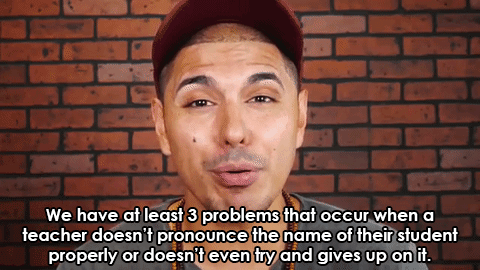

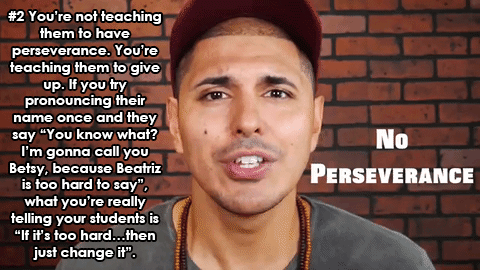

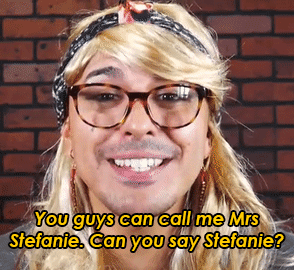
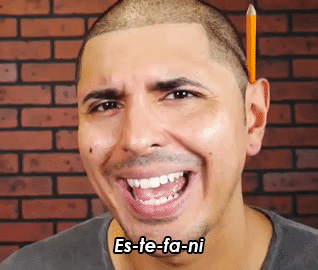
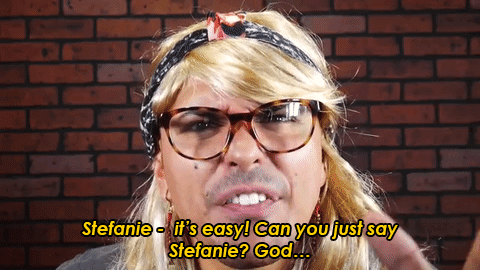
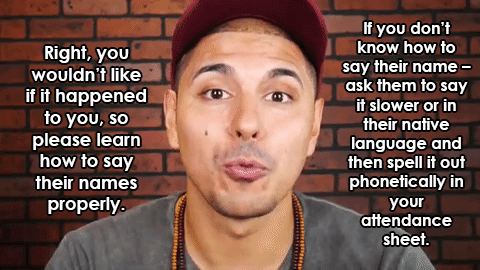

A message to teachers who refuse to pronounce the names of their students of color correctly.
In a new video, Adam Levine-Peres, an educator in the Bronx, talks about the importance of teachers, especially white teachers, learning how to pronounce the names of Black and Brown students properly. He says pronouncing the students’ names correctly “will go along way in the classroom”, otherwise there might be lack of trust, students might end up giving up on things like their teacher gave up on saying their name the right way.
Full video Follow Adam on Twitter @projectbronx
#EthnicNames
